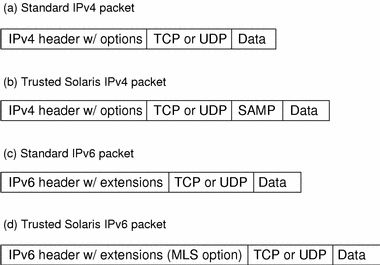Trusted Solaris Data Packets
To understand how Trusted Solaris systems accept data from other Trusted Solaris systems and hosts using other data protocols, compare the standard data packet formats with the Trusted Solaris formats (see figure below).
Figure 3-3 Comparison of Data Packet Formats

In the standard IPv4 format, there is a header with options, followed by a TCP or UDP header and the actual data. The Trusted Solaris version of an IPv4 packet uses the IP options in the header for security attributes and also a SAMP (Security Attribute Modulation Protocol) header identifying the session management protocol and version and security attributes.
The standard IPv6 format contains a header with extensions, followed by a TCP or UDP header and the actual data. The Trusted Solaris IPv6 packet includes a multilevel security option in the header extensions.
When you configure the network configuration databases for your site, you specify all hosts with which hosts on your network can communicate. You set up templates with default security attribute values, categorized by the host types as explained in the following section.
- © 2010, Oracle Corporation and/or its affiliates
